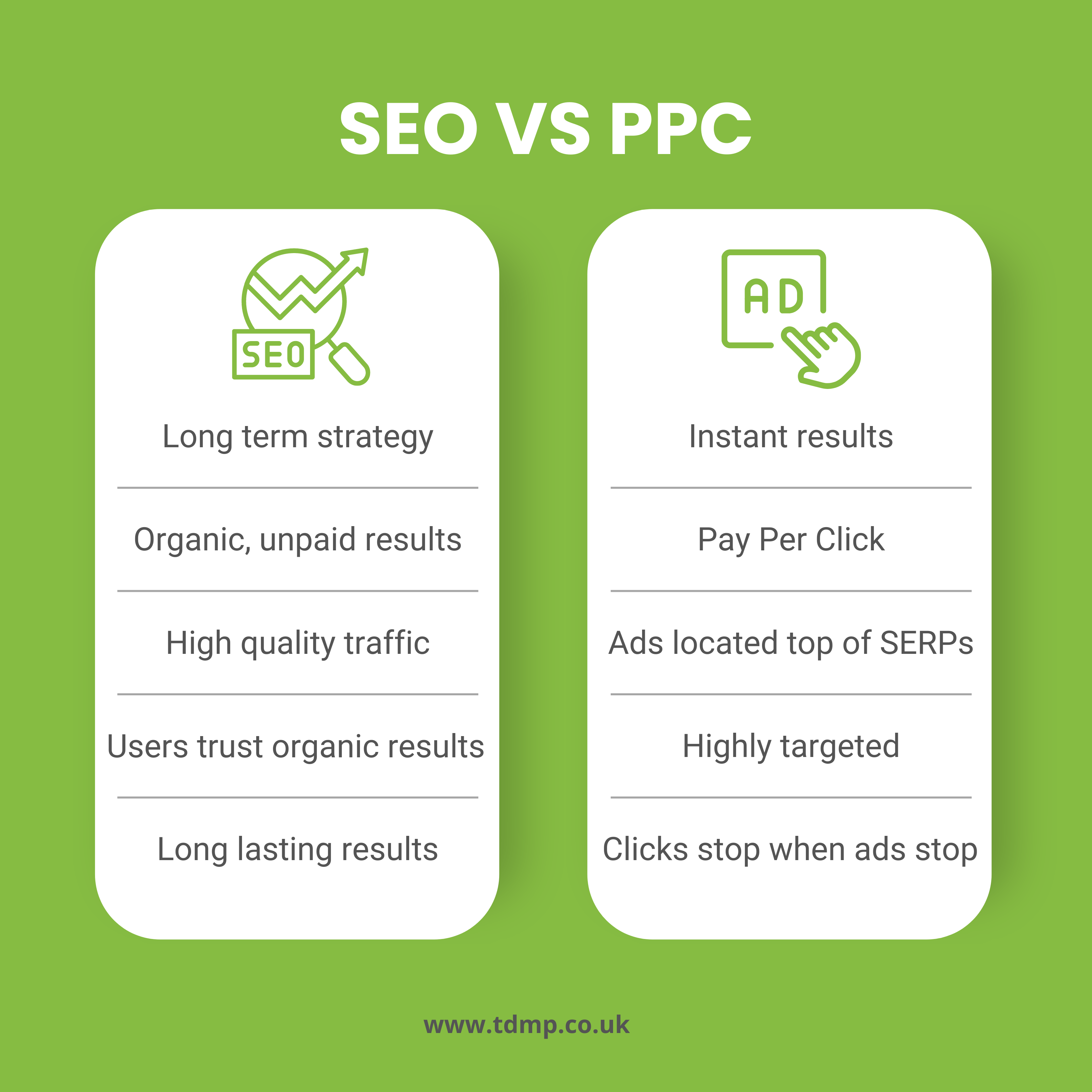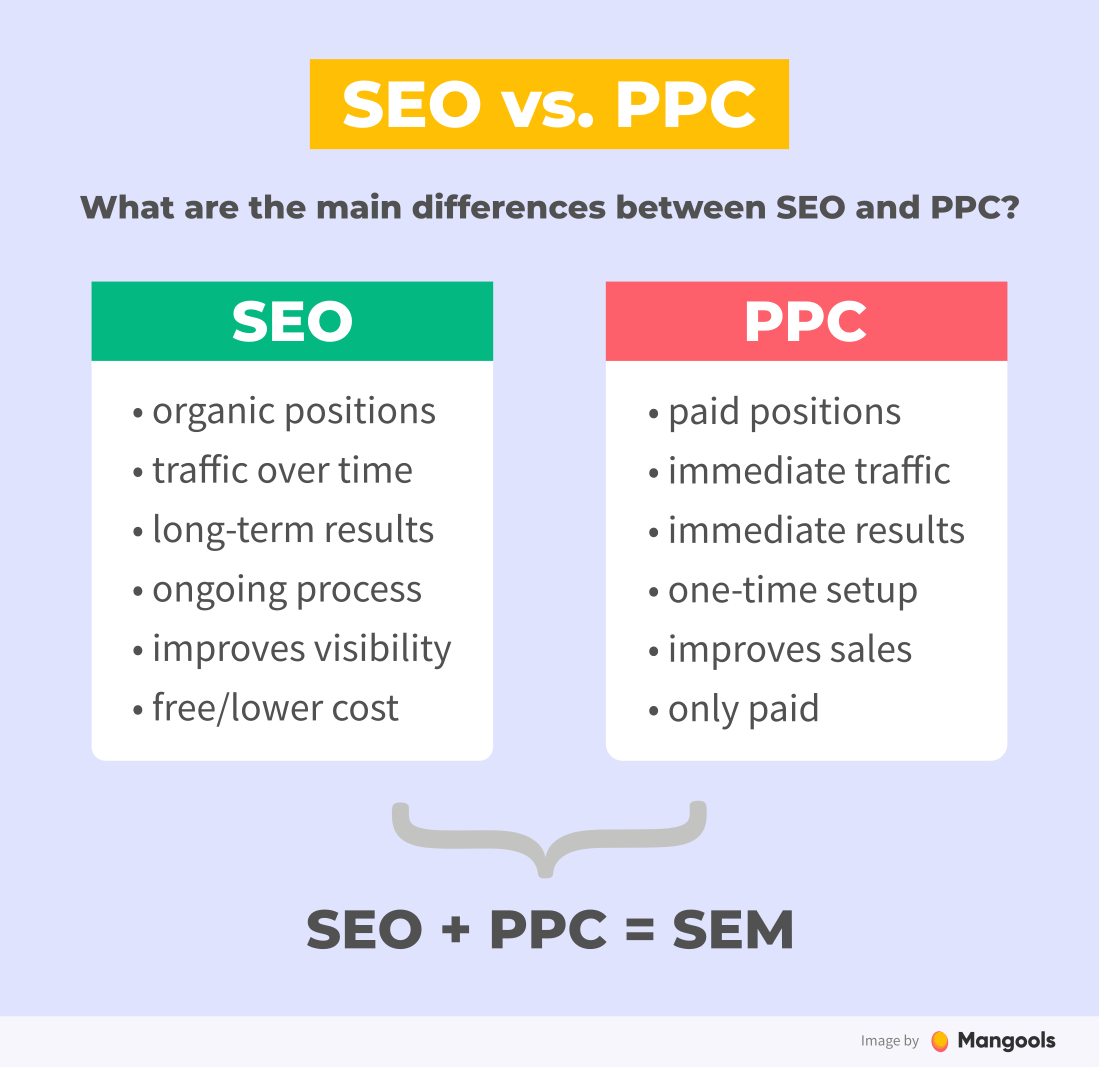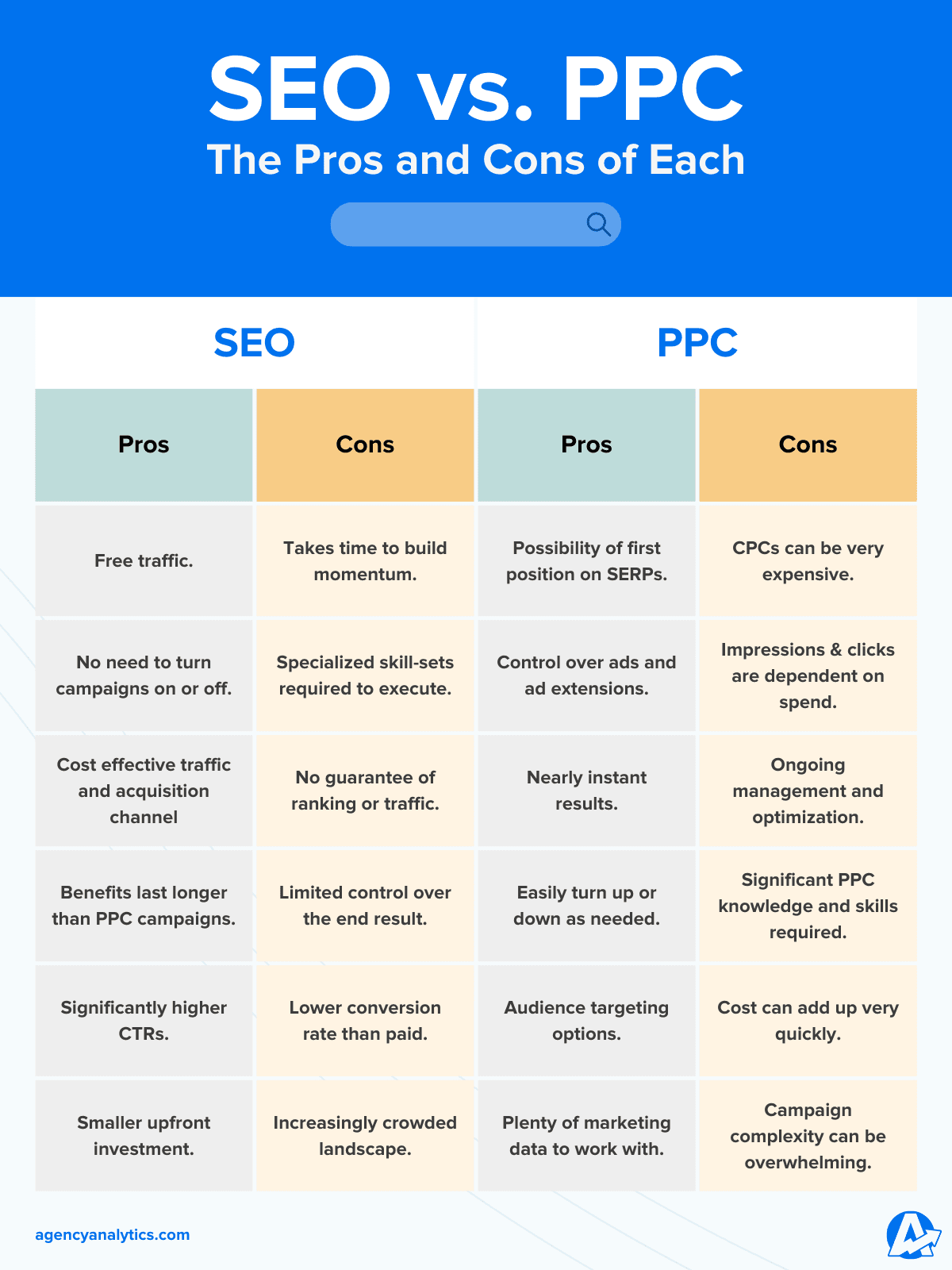SEO focuses on organic search results, while PPC involves paid advertisements. Both aim to increase website traffic but use different methods.
SEO, or Search Engine Optimization, enhances your website to rank higher in organic search results. It involves optimizing content, keywords, and site structure. PPC, or Pay-Per-Click advertising, involves paying for ads to appear at the top of search engine results.
Each click costs money, but it provides immediate visibility. Both strategies have their own benefits and drawbacks. SEO is cost-effective in the long run but takes time to show results. PPC offers instant traffic but requires ongoing investment. Combining both can maximize your online presence and drive more traffic to your website.
What Is Seo?
SEO stands for Search Engine Optimization. It helps websites rank higher in search engine results. This brings more organic, unpaid traffic to a website. SEO involves various strategies and techniques. These aim to improve the visibility of a website in search engines.
Organic Search
Organic search results are listings on search engine results pages. These listings are not paid for. They are earned through effective SEO strategies. Higher organic rankings mean more visibility and traffic. Organic search is a long-term strategy. It requires consistent effort and quality content.
On-page Seo
On-Page SEO refers to optimizing elements on your website. This includes content, HTML tags (title, meta, header), and images. Effective On-Page SEO makes a website more user-friendly and relevant. Key aspects of On-Page SEO include:
- Using relevant keywords
- Creating high-quality content
- Optimizing title and meta tags
- Ensuring mobile-friendliness
- Improving page load speed
Off-page Seo
Off-Page SEO focuses on activities outside your website. These activities aim to improve your site’s authority and rankings. Common Off-Page SEO strategies include:
- Building backlinks from reputable sites
- Social media marketing
- Guest blogging
- Influencer outreach
- Online reputation management
Off-Page SEO helps build a website’s credibility. Search engines consider this when ranking sites.
What Is Ppc?
PPC stands for Pay-Per-Click. It is a form of online advertising. Businesses pay a fee each time someone clicks on their ad. PPC helps drive traffic to websites quickly. It is a vital tool in digital marketing.
Paid Advertising
Paid advertising means you pay for your ads to appear. These ads can show on search engines, social media, and other platforms. Each click costs money, but it can lead to sales and leads. Paid advertising is fast and effective for reaching a large audience.
Popular Ppc Platforms
- Google Ads: The most popular PPC platform. Ads appear on Google search results and partner sites.
- Bing Ads: Ads appear on Bing search results and partner sites.
- Facebook Ads: Ads appear on Facebook, Instagram, and Messenger.
- LinkedIn Ads: Great for B2B advertising. Ads appear on LinkedIn.
Cost Per Click
Cost Per Click (CPC) is the amount you pay for each click. The cost varies based on keywords and competition. High-demand keywords cost more. CPC helps you control your budget. You only pay when someone clicks your ad.
| Platform | Average CPC |
|---|---|
| Google Ads | $1 – $2 |
| Bing Ads | $1 – $2 |
| Facebook Ads | $0.50 – $1 |
| LinkedIn Ads | $2 – $5 |
Key Differences
Understanding the key differences between SEO and PPC is essential. Each strategy has its unique strengths and weaknesses. Knowing these differences helps you choose the right approach for your business.
Cost Comparison
One major difference between SEO and PPC is cost. SEO, or Search Engine Optimization, involves optimizing your website for organic search. This usually requires time and effort but doesn’t involve direct payments to search engines.
On the other hand, PPC, or Pay-Per-Click, requires you to pay for each click on your ads. The cost can vary based on keywords and competition. Here’s a table to illustrate the cost comparison:
| SEO | PPC |
|---|---|
| Low direct cost | Cost per click |
| Time investment | Immediate cost |
Traffic Generation
Traffic generation also differs significantly between SEO and PPC. SEO focuses on organic traffic, which grows over time. This type of traffic is free and often more sustainable.
With PPC, you get instant traffic by paying for ads. Your ads appear at the top of search results, generating quick visits. Here’s a quick comparison in bullet points:
- SEO: Grows slowly, more sustainable
- PPC: Instant traffic, requires continuous payment
Time To Results
The time to see results is another key difference. SEO takes time to build. You may need months to see significant improvements in rankings.
PPC offers immediate visibility. Your ads appear as soon as you start your campaign. Quick results are ideal for short-term goals. Here’s an ordered list to summarize:
- SEO: Long-term, takes months to see results
- PPC: Short-term, immediate results

Credit: www.tdmp.co.uk
Benefits Of Seo
Search Engine Optimization (SEO) offers multiple advantages. It improves your website’s visibility. With SEO, your site appears higher on search engines. Let’s explore some key benefits of SEO.
Long-term Results
SEO provides long-lasting outcomes. Once optimized, your site remains visible for years. You enjoy steady traffic without constant updates.
Unlike Pay-Per-Click (PPC), which stops when payments stop, SEO sustains. This means a long-term investment with ongoing benefits.
Credibility And Trust
Websites ranking high on search engines gain trust. Users trust organic results more than ads. This builds your brand’s credibility.
Higher search rankings make your site appear authoritative. Users believe in your content’s quality and relevance.
Cost-effectiveness
SEO is cost-effective in the long run. The initial investment in SEO can be high. Yet, the ongoing costs are minimal compared to PPC.
With SEO, you don’t pay for each click. This makes it a more sustainable option for many businesses.
Benefits Of Ppc
Pay-Per-Click (PPC) advertising offers numerous benefits that can enhance your digital marketing strategy. Unlike SEO, PPC provides immediate results and can be highly targeted. Here are some key benefits of PPC advertising:
Immediate Visibility
One of the primary advantages of PPC is its ability to deliver immediate visibility. When you launch a PPC campaign, your ads can appear at the top of search results almost instantly. This allows you to reach your target audience quickly.
Immediate visibility is crucial for new businesses or special promotions. It helps in driving traffic to your website without waiting for SEO efforts to take effect.
Targeted Advertising
PPC allows for highly targeted advertising. You can focus your ads on specific demographics, locations, and even times of the day. This level of targeting ensures that your ads reach the most relevant audience.
Here are some ways you can target your PPC ads:
- By keywords
- By geographic location
- By device type
- By time and date
- By audience demographics
Targeted advertising maximizes your ad spend and improves the chances of converting clicks into customers.
Measurable Results
Another significant benefit of PPC is the ability to obtain measurable results. PPC platforms like Google Ads provide detailed analytics and reporting. This helps you track the performance of your ads in real-time.
Key metrics you can measure include:
- Click-Through Rate (CTR)
- Cost Per Click (CPC)
- Conversion Rate
- Return on Ad Spend (ROAS)
- Impressions
These metrics allow you to refine your campaigns and optimize your ROI effectively.

Credit: mangools.com
When To Use Seo
SEO and PPC are two powerful digital marketing strategies. Each serves different purposes. This section will help you understand When to Use SEO. Knowing the right time to use SEO can make a big difference in your marketing efforts.
Building Authority
SEO helps in building authority in your niche. High-quality content and backlinks improve your search engine ranking. Over time, your site becomes a trusted source of information. This authority attracts more organic traffic.
Limited Budget
If you have a limited budget, SEO is cost-effective. Unlike PPC, you don’t pay for each click. Investing in SEO provides long-term benefits. It requires time but saves money in the long run.
Sustainable Growth
SEO ensures sustainable growth for your business. Organic traffic grows steadily over time. Unlike PPC, which stops when the budget ends, SEO keeps bringing visitors. Consistent content updates and optimization enhance long-term success.
| Factors | SEO |
|---|---|
| Cost | Lower long-term cost |
| Growth | Sustainable and steady |
| Authority | Builds over time |
- Focus on quality content
- Invest in link-building
- Optimize for keywords
Understanding when to use SEO can greatly impact your digital strategy. Use SEO for building authority, managing budgets, and ensuring sustainable growth.
When To Use Ppc
Pay-Per-Click (PPC) advertising can be a powerful tool. It is especially useful in specific situations where immediate results are desired. Below are some scenarios where PPC is highly effective.
Quick Results Needed
If you need quick results, PPC is your best option. It can generate traffic almost instantly. Unlike SEO, which takes time, PPC ads appear immediately after launch.
For businesses with a new product launch, PPC can create immediate visibility. This is vital when you want to capture an audience quickly.
Competitive Niches
In competitive niches, SEO can be challenging and time-consuming. Here, PPC can offer a significant advantage. You can bid on keywords and appear at the top of search results.
PPC ensures visibility even in crowded markets. This is crucial for staying ahead of competitors.
Specific Campaigns
PPC is ideal for specific campaigns like seasonal sales or limited-time offers. You can target a particular audience and control your budget. This makes it easier to manage advertising costs.
For example, a holiday sale can benefit from PPC. You can attract buyers quickly and efficiently.
| Scenario | Benefit of PPC |
|---|---|
| Quick Results Needed | Immediate traffic and visibility |
| Competitive Niches | Stay ahead of competitors |
| Specific Campaigns | Targeted audience and budget control |
Combining Seo And Ppc
Combining SEO and PPC can help your business grow. Each has unique strengths. When used together, they can create a powerful strategy. Below, we explore how combining these can be beneficial.
Integrated Strategy
An integrated strategy uses both SEO and PPC. This strategy helps cover both organic and paid search results. It ensures that your business appears in multiple places. This increases visibility and captures more traffic.
- SEO builds long-term organic traffic.
- PPC provides immediate results.
- Combining both ensures consistent traffic flow.
Maximizing Roi
Combining SEO and PPC can maximize your ROI. PPC helps identify high-performing keywords quickly. These keywords can be used to optimize your SEO strategy. This reduces cost and increases efficiency.
| SEO | PPC | Combined |
|---|---|---|
| Long-term traffic | Immediate results | Consistent traffic |
| Cost-effective | Higher initial cost | Optimized spending |
Analytics And Insights
Analytics and insights from both can guide your strategy. PPC data provides immediate feedback. SEO analytics show long-term trends. Using both gives a complete picture of your audience and performance.
- Analyze PPC campaigns for quick wins.
- Use SEO data for long-term adjustments.
- Combine insights for a holistic view.
Combining SEO and PPC leverages the strengths of both. This integrated approach helps you achieve your business goals efficiently.

Credit: agencyanalytics.com
Frequently Asked Questions
What Is A Major Difference Between Seo And Ppc?
SEO focuses on organic search results, while PPC involves paid advertisements. SEO takes time, but PPC offers immediate results.
What Is The Difference Between Seo Traffic And Ppc Traffic?
SEO traffic is organic and free, generated from search engine results. PPC traffic is paid, coming from ads.
How Does Seo Work With Ppc?
SEO and PPC work together by boosting visibility. SEO improves organic search rankings, while PPC drives immediate traffic. Combining both enhances overall site traffic and conversion rates.
Is Seo A Better Investment Than Ppc?
SEO often offers long-term benefits and higher ROI compared to PPC. PPC provides immediate results but can be costly.
Conclusion
Choosing between SEO and PPC depends on your business goals and budget. SEO offers long-term benefits and organic traffic. PPC provides immediate visibility and targeted ads. Both strategies can complement each other. Evaluate your needs to make an informed decision.
Investing in both can maximize your online presence and drive growth.